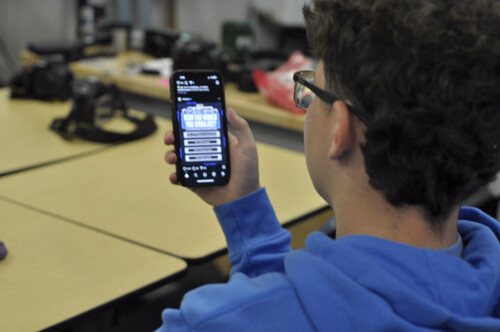Rangers discuss the effects of Governor Newsom’s new law restricting the usage of smartphones at Redwood High School.
By: Haley Padilla
On September 23rd, 2024, the governor of California—Governor Newsom—passed an assembly bill requiring all California school districts to adopt policies restricting the usage of mobile devices by either limiting or forbidding them. The state bill goes into effect on July 1, 2026.
The signing of the legislation happened with the intent to veer students’ focus back to their classwork rather than their devices. A Pew Research Center study conducted that cell phones pose as a distraction within classrooms in high schools and middle schools across the state. Officials also hope to eliminate the threat of cyberbullying and to hinder the rise of mental health issues in the new generation’s youth, presumably caused by smartphones.

instructional time in class
Photo H. Padilla/Gigantea
Prohibiting phone usage at schools was no immediate action—policies to ban smartphones within schools began to form in 2019. Governor Newsom signed a law specifying that school districts had the power to regulate the use of cell phones during the hours of the school day. The governor recently made efforts to limit phone usage known back in June.
Maintaining student safety will remain a crucial responsibility, therefore students will be allowed to access their phones during an emergency, a potential threat of danger, or as authorized by administrators and teachers on campus.
Though, how will this new law affect Redwood’s current phone policies?
As of now, there are no mandated policies that Redwood will adopt. The existing phone policy relates to the restriction of smartphone usage during instructional time in classes; the exception being teachers allowing it for academic purposes.
“What our district is doing is thinking through the process of how we go about enforcing something like that—something that is going to be different than what we’re used to,” says Dr. Gridiron, Redwood’s Principal. “So working with our parents, our school sites, and our students about the best ways in which we could enforce the new mandate and really [make] sure that it increases student engagement.”

RHS Principal
Photo courtesy of Dr. Gridiron
The change will likely have a significant impact on Redwood’s campus. Dr. Gridiron says, “kids will be unfamiliar with it, not used to it, maybe even uncomfortable, by not having the cell phone that they’re used to having with them 24/7.”
“There’s a lot of time spent utilizing their devices, because it’s right there with them,” said Dr. Gridiron. “I think over time students will start to realize how much it distracts them. Not even just students, but adults as well.”
“I think what it’ll do is it’ll impact face-to-face communication with people, which is what I’m looking forward to—just that ability to have a conversation with someone. It’ll also increase their engagement in the classroom because they’re not so distracted by the cellphone.”
Educators observe both the positives and negatives of the circumstance, understanding that it will aid the improvement of student’s attention spans and participation, though also seeing how conflict could arise in the process.
“If it creates more angst, anxiety, frustration, and challenges, then I think we would need to revisit what’s happening,” says Dr. Gridiron. “We just have to make sure we’re looking at the impact once it is executed and then decide what adjustments need to be made after that.”
Ranger freshmen—students whose junior and senior years will be affected—vocalized their concerns with the phone bill.
“I won’t be able to inform my parents about anything that’s happening after or before school,” says Jairo Navarro, ‘28. “It’s unnecessary because you can just put it away for the rest of the day.”
“I’m not a big phone user, especially at school. I only use it if it’s for an emergency, but I do, at times, use my phone in class if I need to do an assignment or if my computer’s not working,” says Sofia Zambada, ‘28.
“I honestly don’t think it’s the best idea, because I feel like phones can, at times, be very useful in and outside of the classroom. In all aspects, I feel like in case of an emergency or to have more accessible school work, it’s more convenient,” Zambada says.
Tags: news, phones, redwood gigantea, redwood high school, redwood journalism, redwood rangers, visalia ca


There’s already too many kids dropping out of school. Banning cell phones may increase those numbers. But oh well, it is what it is♀️